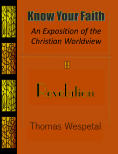






Volume 2
Revelation
Introduction to Volume 2
A key element in our quest to know God is discovering how He has revealed Himself. God is so much greater than we are that we cannot fully grasp Him simply with our intellect. We must depend on His good favor to make Himself known to us, that is, we rely on His self-
We can summarize the contents of this volume as follows. God has revealed Himself primarily and most authoritatively in verbal form, that is, through language. God’s authoritative words are contained exclusively in the 66 books of the Protestant biblical canon. Although the original biblical books have long ago perished, we rely on the science of textual criticism to restore these autographs. The original autographs are verbally and fully inspired, i.e., every word they contain is the very Word of God. We interpret God’s revelation by means of the grammatico-
Since the Word of God comes to us in two Testaments, Old and New, the question arises about the relationship between them and the application of the Old Testament to New Testament believers. In this volume, we defend the premise that the Old Testament Law applies to the New Testament believer in an adapted form, namely the “law of Christ.” God’s Old Testament promises find fulfillment both in the Church and later in Israel, which will turn to Jesus as Messiah in the end times. We will also investigate the sometimes curious use of the Old Testament in the New. We conclude that along with direct application of Old Testament ideals in the New Testament, we also observe new applications of Old Testament principles and typological application of certain Old Testament passages.
This volume also evaluates several aberrant interpretive methods, namely allegorical interpretation, the historical-
Finally, we are interested in not only faithfully interpreting individual passages of Scripture, but also in formulating Christian doctrine from the Bible and constructing a wholistic Christian worldview. Therefore, this volume concludes with a discussion of the theological process, by which Scripture becomes theology, and which will serve as the basis for investigating doctrinal questions in subsequent volumes of this series.







